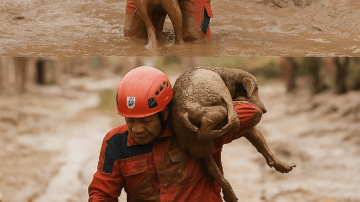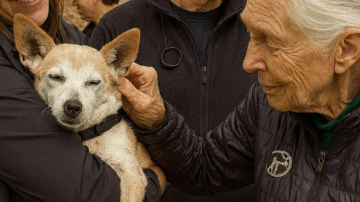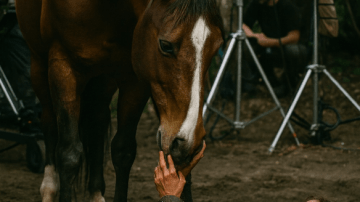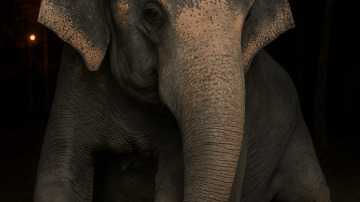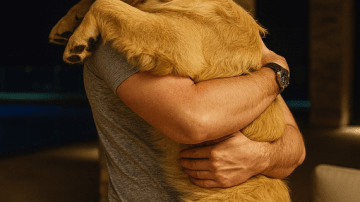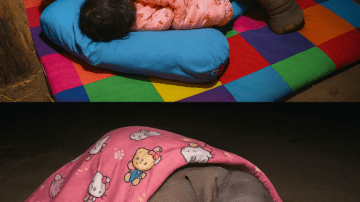On my way home from picking beans, I suddenly heard a faint cry coming from the grass. At first, I thought I had misheard, but when I followed the sound, I discovered something that made my heart stop—a tiny puppy, lying helplessly on the ground, crying out for help.

I bent down to look more closely. His eyes weren’t even open yet. He was far too young to be on his own. Without a second thought, I picked him up. I had no plan, no preparation, but leaving him there wasn’t an option.
Back home, I realized I had nothing for a newborn puppy. No formula, no bottles, no blankets. So I improvised. I poured a little milk into a plastic bottle, then let it run slowly into the palm of my hand. I cupped the puppy gently and guided his tiny mouth to the milk. Hungry and desperate, he latched onto my hand, sucking with all his might. The milk trickled along the lines of my palm and into his mouth. He had no teeth yet, which was a blessing—otherwise, my hand might have been chewed raw. But his hunger was overwhelming. He didn’t stop until he had drained every drop.
By the third day, I managed to buy proper puppy formula and a small bottle meant for lambs. When I fed him, his eyes opened for the first time. No longer content to lie still, he wriggled and kicked furiously while nursing. Feeding became a two-handed job: one hand to hold him steady, the other to keep the nipple in his mouth.

At 3 a.m., I was woken by his cries. Every two hours, he needed feeding. After each meal, I had to gently rub his belly to help him urinate. A newborn puppy eats around the clock, about 20 ml per meal, and it quickly became a rhythm that consumed my nights. Exhausting, yes—but every time he clung to life, it was worth it.
By the fifth day, he had grown stronger, feistier. He kicked and thrashed during feedings, his paws flailing in protest whenever the nipple slipped out. I would laugh quietly at his stubbornness. Each night, I stayed up late—mixing formula, feeding him, cleaning up after him. It was tiring, but in my heart I knew: this tiny life deserved every bit of love and effort.
By the tenth day, his progress amazed me. He was learning to eliminate on his own. I still cleaned up after him, but I didn’t mind. I joked that I had become his “professional poop collector.” He grew rounder, more chubby, his once fragile body now sturdy enough to wiggle happily when he saw me. When he cried, I could tell whether he was hungry or just needed to pee.

On the fifteenth day, changes came fast. Only days earlier he could barely walk without stumbling. Now, he was running—albeit clumsily—around the house. He followed me everywhere, his little tail wagging like a metronome. He loved the vegetable garden, trotting behind me, curious about every leaf, every smell.
By the seventeenth day, he had invented new ways to nurse—sometimes standing, sometimes sprawled across my arm, always demanding. His appetite grew. What began as 20 ml per feeding had now increased to 50 ml. His belly became round and firm, often bigger than his head, and I couldn’t help but laugh at the sight.
When the twentieth day came, I officially named him Doudou. Since I had found him while picking beans, it seemed only fitting—Doudou, my little bean. He was learning to climb, to escape from his cage, to protest when confined. I lined his cage with blankets at night, but soon even the bottle didn’t fully satisfy him. It was time to prepare for solid food.

At twenty-three days, he tasted his first solid meal: rice porridge mixed with ground meat. He devoured it eagerly, licking the bowl clean. Afterwards, full and content, he waddled to the door, curled up, and fell fast asleep, as though guarding the house already.
Every day brought new joy. He played with curtains, tugged at fabrics, turning even the smallest scraps into toys. Mischievous, curious, unstoppable—Doudou was no longer the fragile newborn I had once feared would not survive.
Three months passed. The tiny puppy I had picked up, eyes still sealed, had grown into a strong, playful Chinese rural dog. His legs were sturdy, his tail wagged proudly, and his eyes sparkled with life. He had gone from surviving on milk dripped into the palm of my hand to eating solid meals, running freely, and filling the house with laughter.
Doudou wasn’t just a stray I rescued. He was family now.
Looking back, I remembered the fear of those first nights—the worry that he might not make it, the sleepless hours feeding him every two hours. But every ounce of effort had paid off. He had survived. He had thrived.
Now, when I see him bounding through the garden, wagging his tail, barking with confidence, I can’t help but smile. Doudou was once a helpless scrap of life in the grass, but now, he is my joy, my companion, my reminder that sometimes, miracles come in the smallest of packages.

